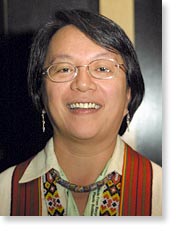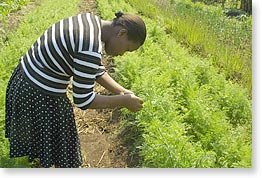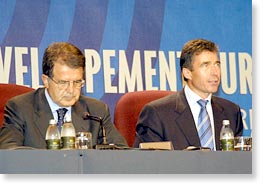|
Interview with Victoria Tauli-Corpuz
of Tebtebba Foundation An indigenous people’s policy research center “Democracy In Relation To How Food Is Distributed" Johannesburg, South Africa
Victoria Tauli-Corpuz is executive director of “Tebtebba Foundation, an indigenous people’s policy research center. It’s an organization that has been set up by indigenous peoples to do their own research, to do their own advocacy, to promote indigenous people’s rights and to build the capacity of indigenous peoples to fight for their rights. It is based in Baguio City in the Philippines.” -- Victoria Tauli-Corpuz. This interview was conducted September 2, 2002 by Nic Paget-Clarke for In Motion Magazine during the United Nations World Summit on Sustainable Development in Johannesburg, South Africa.
Sustainable Agriculture and Rural Development In Motion Magazine: You are involved in the SARD (the Sustainable Agriculture and Rural Development) initiative? Victoria Tauli-Corpuz: Yes. However my involvement is quite limited. In Motion Magazine: Can you say why you are involved? What do you think is good about it? Victoria Tauli-Corpuz: I think sustainable and rural agriculture should really be an area which indigenous peoples should be concerned with. Indigenous peoples all over the world are very much involved in agriculture basically for domestic use but also a little for the local markets. What is happening more and more is that the kind of agriculture we practice, which is very ecological and sustainable is being undermined by highly commercialized and chemical intensive agriculture, which has become the mainstream agriculture model. The role of women in sustainable agriculture In Motion Magazine: I was talking to the SARD Initiative facilitator Eve Crowley and she said that you in particular are involved with the role of women in sustainable agriculture.
There is a lot of research that shows that women have a central role in ensuring that food security is there, in their own communities. But unfortunately, as I said earlier, this capacity is very much undermined and I am hoping that the SARD initiative will be an initiative that will help strengthen and reinforce these roles that women are playing in sustainable agriculture. Food security / food sovereignty In Motion Magazine: What is the connection between food security and food sovereignty? Victoria Tauli-Corpuz: Food security is about ensuring that you have adequate food to meet your daily needs. Food sovereignty is being able to have the capacity to decide on what kinds of foods are going to be planted or introduced in a particular community, being able to decide which agricultural policies should be adopted by a country or a local community, having to capacity to practice land tenure systems which are supportive of ensuring food security, etc. I think, now, more and more countries all over the world have great difficulty in having the freedom to decide agricultural policies which are appropriate for the country and the people; what kinds of products to produce, what kind of foods should be brought in - whether it is genetically modified food or not. We have heard earlier about the World Food Program supplying genetically-modified foods to countries which need food aid. I think that if you don’t have the possibility to say no against that kind of importation of food, or use of genetically-modified food for even food aid, that you don't have any food sovereignty. I think that (food sovereignty) should be a key issue when we are talking about agriculture, food security, and the capacity of peoples to decide for themselves. It is the right of peoples to be self-determining in deciding their own food and agricultural policies. GMOs and the Precautionary Principle In Motion Magazine: What is your opinion on GMOs (genetically-modified organisms)? Victoria Tauli-Corpuz: I'm very much worried about how GMOs are being promoted as the solution to world hunger because this diverts us from appreciating what the real issues are and dealing with them. A lot of food is being produced. The FAO admits that there is surplus food produced. The problem is more about how food is distributed and how artificially cheap subsidized food is being dumped in the developing world, leading to the destruction of traditional livelihoods of millions of people. If third world people cannot produce their domestic food crops anymore, and they do not have money to buy food, then of course there will be world hunger. Another problem is that developing countries opt to focus more on the production of cash crops for export instead of supporting, as a priority, domestic food production. It is not because we lack high technology, such as genetic engineering in food production. This idea that genetically modified crops will feed the world is sheer propaganda from the side of biotechnology companies and the First World governments like the United States which is acting as the world’s GMO agent. The environmental and health impacts of genetically-modified crops are not yet known. The precautionary principle, which is one of the Rio principles, should guide the production, promotion and trade of these. This is precisely the reason why a biosafety protocol has been established in the convention on biological diversity. It is a recognition that GMOs pose actual and potential risks and hazards and therefore the trade of this should be regulated. Beyond food / Access to markets In Motion Magazine: Do you think that in the context of world trade or trade liberalization that food sovereignty goes beyond just food? Victoria Tauli-Corpuz: Yes. I think that food sovereignty should go beyond even food. Developing countries are subjected to various legally-binding rules and loan conditionalities such as: the WTO agriculture agreement which restricts or undermines the possibilities for you to determine your domestic policies to ensure food security; or World Bank and IMF structural adjustment policies which lead them to deregulate laws which protect the country from becoming a dumping ground of artificially-cheap subsidized food or GMO seeds. It deals with the problem of your access to markets. It deals with the problem of what kinds of policies should a government put in place to protect its small farmers and indigenous peoples. The issue of land rights comes into the picture. It deals with the right of peoples to self-determination, the right to determine your economic, social and cultural development. We are seeing a world where the right to self-determination and the right to food are seen as trade barriers or are trumped in favor of trade rules. So, when we talk of food sovereignty, we have to go beyond food and look at all the factors which cause world hunger and poverty. In Motion Magazine: What do you think about organic farming? Victoria Tauli-Corpuz: I think much more work has to be done in terms of research and support for organic farming. I am an indigenous person and I grew up in my own town where the use of chemical fertilizers and pesticides is not very widespread. The traditional way of producing food is still very much practiced. The few who tried to do chemical-based agriculture shifted back to organic agriculture because they cannot afford to buy these chemicals and they also saw the adverse impacts of the use of such. I believe there is a future for organic farming. Unfortunately, there is very little support for this from governments. Even the Philippine government would promote more the use of chemicals and GMOs rather than supporting organic agriculture. Public universities or research institutions, which do not receive adequate support from the government, more and more depend on research money provided by chemical or biotechnology companies. So, they promote the use of chemicals and GMOs to the detriment of supporting more traditional, organic agricultural practices and technologies. What is even more troubling is that “organic farming” as a concept is also being corrupted by those promoting GMOs. There are now attempts to include GMOs as part of organic farming. I think the practitioners of organic farming should be very discriminating on how they define organic farming. It is not just a technology, it is also a political agenda. In Motion Magazine: What do you think of this conference? Victoria Tauli-Corpuz: This is a very difficult summit because of the great disparities between the countries, in terms of economic and political power, and because of the globalization agenda of the OECD (Organization for Economic Cooperation and Development) countries. What we see is backtracking from the agreements reached in Rio ten years ago. Even the basic Rio principles such as common and differentiated responsibilities and the precautionary principle had difficulties being reaffirmed. The negotiators here are not very familiar with the negotiations in the WTO, which are undermining Agenda 21. The role of the major groups who cross between WTO and the U.N. has been very important in reminding governments of the conflicts between the environmental and trade agreements. What is good about this is that the Major Groups (editor: farmers and farmer organizations, women, youth, indigenous peoples, workers and trade unions, NGOs, the local authorities, business and industry, and the science and technological community) are here and are actively trying to lobby so that at least the document that will come out of this will reflect the aspirations and demands of the poorest peoples in the world. There is much more coordination between the major groups compared to how it has been before. For indigenous peoples, we had our own preparatory processes before this summit and we came up with our own Kimberly Declaration and implementation plan of action for sustainable development. This will guide us in our engagement with the U.N. and even with the WTO in the future. In Motion Magazine: What do you think of the role of the U.S.? In Motion Magazine: Is it too simple to say that one way of looking at the world is the viewpoint of the IMF (International Monetary fund) and World Bank and WTO (World Trade Organization) and the other is a more democratic United Nations approach? Victoria Tauli-Corpuz: No, I do not think that this way of looking at the world is too simplistic. The reality, as we can clearly see here, is that the powerful nations, who are the ones who have a greater say in the World Bank-International Monetary Fund (WB-IMF) and the World Trade Organization (WTO), are putting more weight to the rules of these bodies as these have teeth to ensure the adherence of the developing countries. The WTO rules are legally binding and the WB-IMF conditionalities have to be implemented by countries who need loans to pay their foreign debts. Then we have the U.N., which has a more democratic governance system but many of its rules are not legally binding. Even the valiant attempt of the U.N. to make a code of conduct for TNCs (trans-national corporations), was killed by the U.S. before the Rio summit. This is why indigenous peoples and other major groups are still making an effort to make the U.N. work, even if we have seen how it has been and still is being undermined by the powers that be. In spite of all its limitations, it is still the only global multilateral body which has the overarching framework of human rights and the possibility of balancing the immense powers of the United States, the World Bank, the WTO and IMF and even the EU . The U.N. after all, is still “We the peoples” even if it is an organization of states. Many people still (believe) that the U.N. will be able to provide balance in a world which is highly inequitable. Food sovereignty and world democracy In Motion Magazine: To go back to the food sovereignty issue, one of the speakers just now was talking about the need to create some sort of world democracy. Do you think food sovereignty plays a role in that? Victoria Tauli-Corpuz: I think so. If you have a situation where there is too much food produced but it remains in the hands and control of these big multinational corporations, and they can afford to dump the food that they are producing just to make sure that they get profits, then we have to talk about democracy in relation to how food is distributed and who is really controlling the food produced in this whole world. Using food as an example of how inequity and injustice prevails and how basic human rights are being violated would make people more aware of what more needs to be done. It will make them campaign harder for more democratic economic, political and social structures and rules. |
||||||||||||||||||||||||||||
| Published in In Motion Magazine, June 20, 2003 |
||||||||||||||||||||||||||||
If you have any thoughts on this or would like to contribute to an ongoing discussion in the  What is New? || Affirmative Action || Art Changes || Autonomy: Chiapas - California || Community Images || Education Rights || E-mail, Opinions and Discussion || En español || Essays from Ireland || Global Eyes || Healthcare || Human Rights/Civil Rights || Piri Thomas || Photo of the Week || QA: Interviews || Region || Rural America || Search || Donate || To be notified of new articles || Survey || In Motion Magazine's Store || In Motion Magazine Staff || In Unity Book of Photos || Links Around The World NPC Productions Copyright © 1995-2018 NPC Productions as a compilation. All Rights Reserved. |
||||||||||||||||||||||||||||




